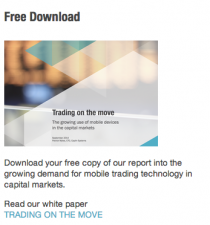Today’s question, can a trading platform become too big?
Or, to be specific, could FXall become too big (or too dominant) for the banks that support it with liquidity? According to the recent FXall $100mln IPO filing, FXall controls some 30% of the multi-dealer FX platform market through their various platforms.
Whilst it clearly makes sense for banks to support and reward with greater liquidity provision, those platforms that can bring them client order flow, there will come a point, where the platform is deemed by those same liquidity providers as possibly becoming too large and/or at risk of becoming too dominant.
At that point, banks will naturally start to support other platforms in order reduce their dependency on the dominant platform.
Could this now be what’s happening with Bloomberg’s FXGO?
According to Bloomberg’s head of FX and Economics Tod Van Game FXGO is gaining traction, with volumes rising 40% over the past year, and number of trades up 50%.
In the past the banks that showed little or no interest in showing clients prices over Bloomberg are now coming to us and asking how they can be more successful on our platform,” says Van Name.
 FX flows on multi-dealer platforms (from Client Knowledge 2011)
FX flows on multi-dealer platforms (from Client Knowledge 2011)
Of course, much of the growth is also to do with Bloomberg’s ubiquitous deployment within the buyside, cross asset capabilities and strong STP capability, but nonetheless my question still stands.
Filed under: FX, Single-Dealer Platforms |



[…] influence on possible intermediation of their bank-client relationships, as mentioned here in could FXall become too big. Share this:EmailDiggStumbleUponTwitterFacebookPrintLinkedInLike this:LikeBe the first to like this […]
[…] Bank ownership: Under SEF rules, bank ownership is limited to under 25%, so will be interesting to see whether the current FXall bank shareholders each of which hold 5.1% (BNP, Citi, Credit Agricole, CS, Goldman, HSBC, MS, RBS – although the top three FX banks, Deutsche, UBS and BarCap are not shareholders in FXall) will cash in, or stay onboard to have a stronger influence on possible intermediation of their bank-client relationships, as mentioned here in could FXall become too big. […]
[…] As mentioned previously, Bloomberg’s FXGO offering is starting to gain some real traction with buyside firms (although from a much lower base level), and given Bloomberg’s traditional strength in workflow solutions, and footprint in buyside firms, Reuters needed to do something to prevent themselves from being marginalised within the buyside. […]